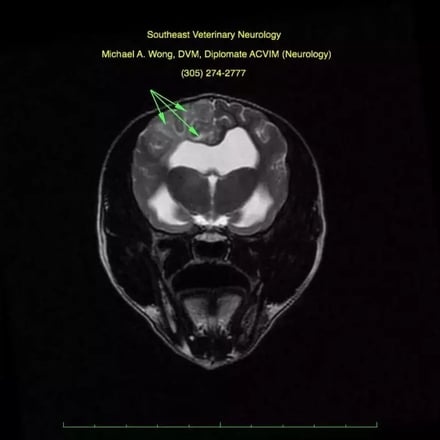Encephalitis in Dogs
Home » Conditions We Treat » Encephalitis in Dogs
What is encephalitis?
When the brain becomes inflamed, this is called encephalitis. The breeds most likely to develop encephalitis are Yorkshire Terriers and various other terrier breeds, along with Maltese, Chihuahuas, and Pugs. Encephalitis most commonly affects young adult or adult dogs, can progress rapidly, and may even be fatal. Because of this, we recommend immediate care from our veterinary neurologists at Southeast Veterinary Neurology (SEVN) if your pet is showing signs of encephalitis. Download a fact sheet.
Inflammatory disease, such as encephalitis, is one of many conditions we can treat. If your pet needs an evaluation, contact us right away.
What causes encephalitis in dogs?
Encephalitis, or inflammatory disease of the brain, has two main causes: infectious and noninfectious. Noninfectious causes are more common in dogs, and thought to be due to an overactive immune system (the part of the body that normally protects it from infections). When the immune system is overactive, it can attack normal parts of the body. In dogs with encephalitis, the body's defenses attack the brain.
When the coverings of the brain (meninges) are affected, it is known as meningitis. When both the brain and the meninges are affected, it is called granulomatous meningoencephalitis (GME).
Sometimes, the spinal cord is affected, known as myelitis. All of these conditions are sometimes referred to together as meningoencephalomyelitis or MUE (meningoencephalomyelitis of unknown etiology).
Symptoms of Encephalitis
Clinical signs of inflammatory disease depend on which area of the nervous system is affected. Dogs with encephalitis often show the following:
- Seizures
- Walking in circles
- Behavior changes
- Lack of balance
- Blindness

High-field MRI of a dog’s brain with encephalitis. The arrows show ‘hyperintensity’ of the white matter on the left side of the screen. Also note that the ventricles (bright white) is asymmetrical.
How do we diagnose encephalitis in dogs?

High-field MRI of a dog’s brain with encephalitis. The arrows show ‘hyperintensity’ of the white matter on the left side of the screen. Also note that the ventricles (bright white) is asymmetrical.
Encephalitis can be suspected based on age, breed, history, clinical signs, and a neurological examination. However, since other neurological conditions can cause similar symptoms, we need additional testing to help us narrow down possible causes.
- An MRI is the best way to safely look at your dog's brain. This allows us to diagnose encephalitis and/or rule out other possible causes of your dog's symptoms. MRI will also show us the extent and severity of the inflammation. Finally, MRI will tell us if a spinal tap is safe for your pet.
- A CSF analysis (spinal tap) is often necessary in patients with signs compatible with encephalitis. With encephalitis the analysis may show an elevated nucleated cell count (pleocytosis) with increased protein levels. We will only perform a CSF analysis if absolutely necessary.
Finding a Treatment
Encephalitis is a serious condition. Our goal is to give pets with encephalitis the best chance at a longer life. We use medications to treat the inflammation and overactive immune system. Many dogs do very well with medications, while some will have relapses and need medications for an extended period of time, and others will not respond to medication at all. We will discuss the various options for treatment and prognosis with you in depth if we diagnose your pet with encephalitis.